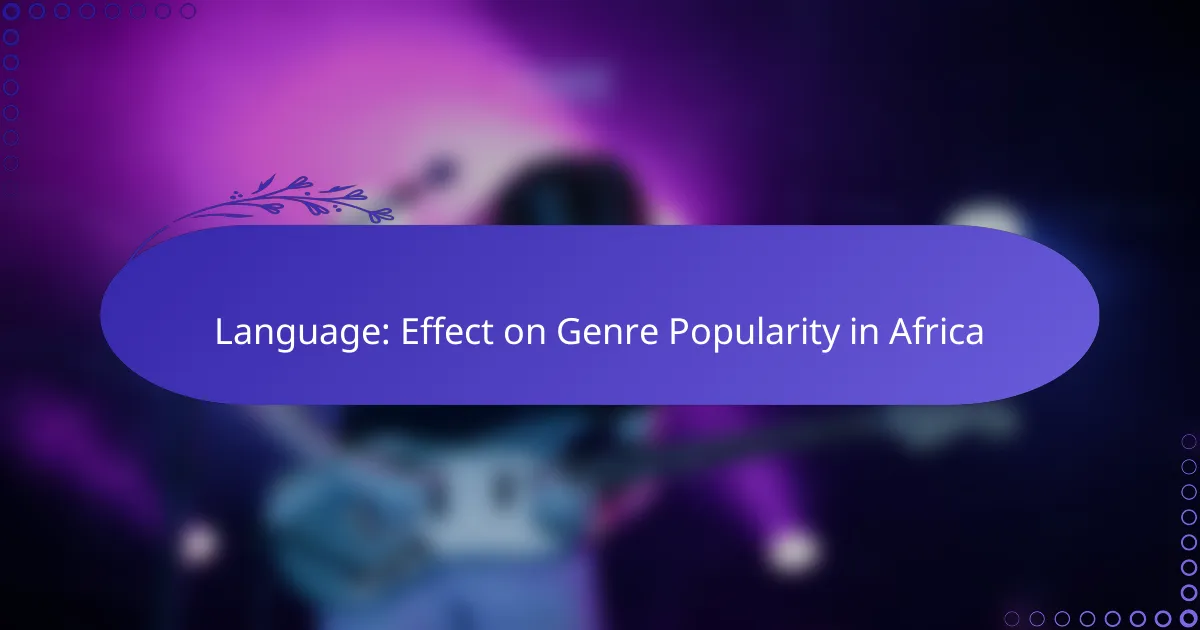Language plays a crucial role in shaping genre popularity across Africa, influencing both accessibility and audience engagement. In regions where specific languages dominate, certain artistic expressions, such as hip-hop and Afrobeat, flourish, reflecting the continent’s rich cultural diversity and storytelling traditions.
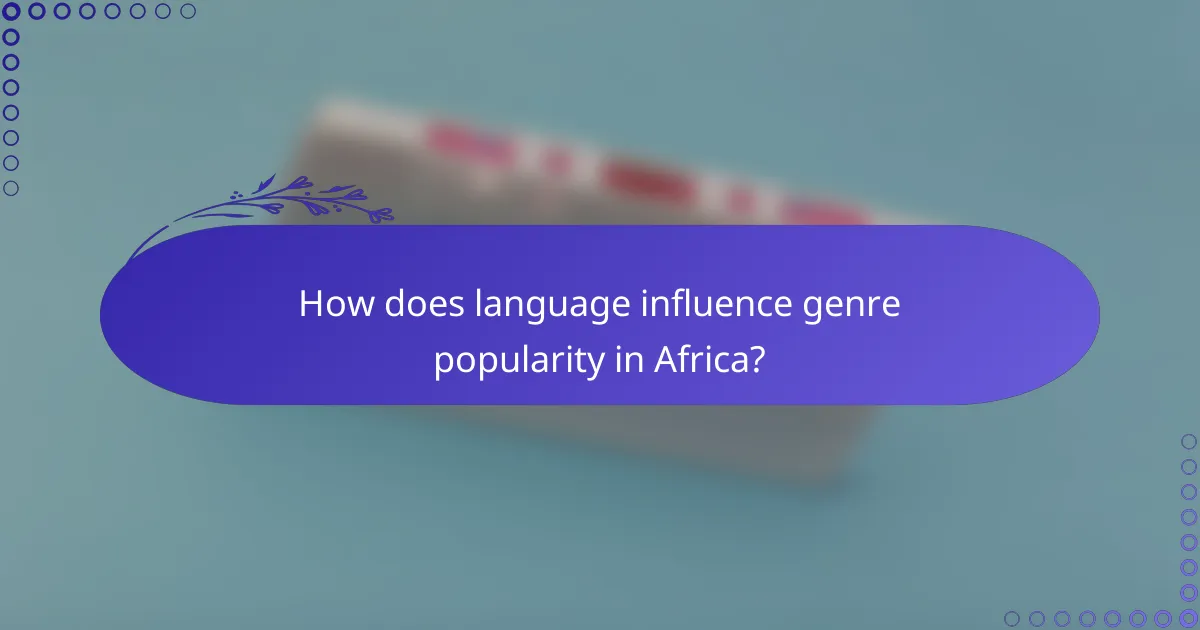
How does language influence genre popularity in Africa?
Language significantly shapes genre popularity in Africa by determining accessibility and audience engagement. The prevalence of certain languages can enhance or limit the reach of various artistic expressions, influencing what genres thrive in different regions.
English as a dominant language
English serves as a dominant language in many African countries, often acting as a bridge for communication across diverse linguistic groups. This widespread use facilitates the consumption of genres like pop music, contemporary literature, and films that are primarily produced in English.
As a result, English-language content tends to receive more media exposure and marketing support, which can overshadow local languages and their associated genres. This dominance can create a cultural hierarchy where English-speaking artists gain more recognition and resources.
Impact on music genres
The influence of language on music genres in Africa is profound, with English often leading to the popularity of genres such as Afrobeats, hip-hop, and R&B. Artists who incorporate English lyrics or themes can reach broader audiences, both locally and internationally.
However, this can marginalize traditional music genres that are performed in local languages. While some artists blend local dialects with English to create unique sounds, the overall trend favors English-dominant genres, impacting the diversity of musical expression.
Effect on literature trends
In literature, English has become a key language for many African authors, allowing them to connect with global audiences. Works written in English often receive more attention from publishers and literary awards, which can lead to increased sales and readership.
Conversely, literature in indigenous languages may struggle for visibility, despite its cultural significance. This disparity can lead to a decline in the production of works in local languages, affecting the preservation of cultural narratives and storytelling traditions.
Influence on film and television
Language plays a crucial role in film and television, with English-language productions often dominating the market. This trend is evident in the popularity of Nollywood films that incorporate English, which can attract both local and international viewers.
While there is a growing interest in films produced in local languages, they often face challenges in distribution and funding. As a result, filmmakers may choose to produce content in English to ensure broader reach and financial viability, potentially limiting the representation of diverse cultural stories.
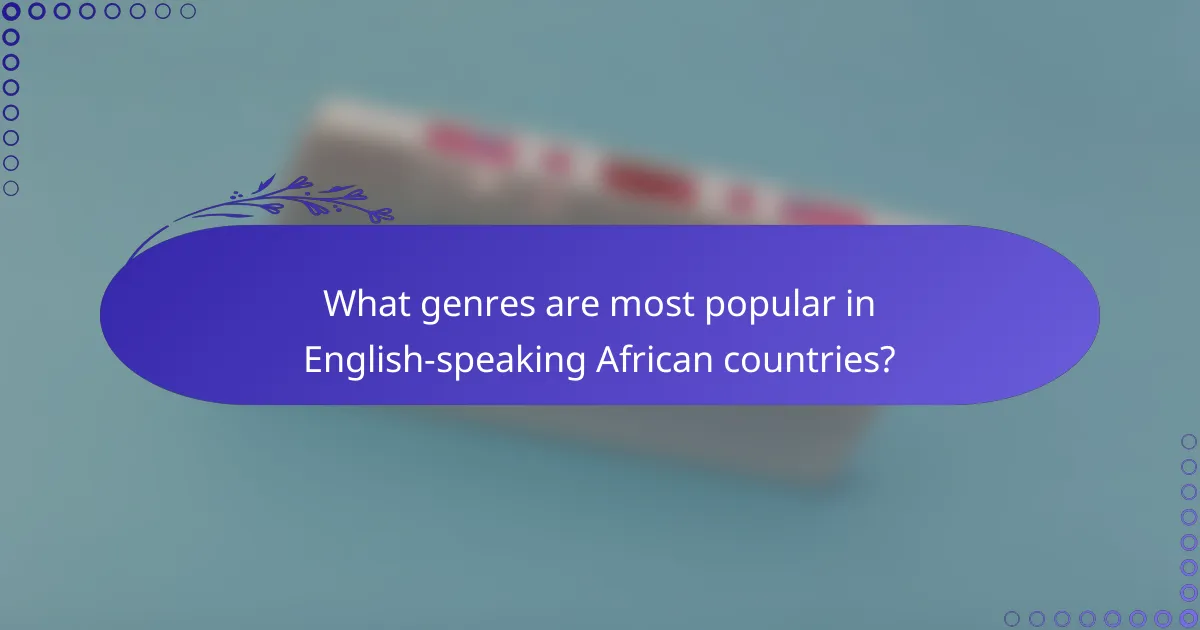
What genres are most popular in English-speaking African countries?
In English-speaking African countries, genres such as hip-hop, Afrobeat, romantic films, drama films, and contemporary literature have gained significant popularity. These genres reflect the cultural diversity and dynamic storytelling prevalent in the region.
Hip-hop and Afrobeat
Hip-hop and Afrobeat are two of the most influential music genres in English-speaking Africa, resonating with the youth and reflecting social issues. Artists like Burna Boy and Wizkid have popularized Afrobeat globally, while local hip-hop artists often address themes of identity, struggle, and empowerment.
These genres thrive on collaboration, with many artists blending traditional African sounds with modern beats. This fusion not only enhances their appeal but also fosters a sense of community among fans and musicians alike.
Romantic and drama films
Romantic and drama films are highly favored in English-speaking African countries, often featuring relatable narratives that explore love, family, and societal challenges. Nollywood, Nigeria’s film industry, is a major player, producing numerous films that captivate audiences across the continent.
These films frequently incorporate local languages and cultural elements, making them resonate deeply with viewers. The rise of streaming platforms has further expanded access to these films, allowing for a broader audience and greater appreciation of African storytelling.
Contemporary African literature
Contemporary African literature has gained traction, with authors exploring themes of post-colonial identity, migration, and social justice. Writers like Chimamanda Ngozi Adichie and Ngũgĩ wa Thiong’o have garnered international acclaim, showcasing the richness of African narratives.
This genre often reflects the complexities of modern African life, blending traditional storytelling with contemporary issues. Book clubs and literary festivals across the continent have contributed to a growing readership, encouraging discussions around these impactful works.

How does language diversity affect genre consumption?
Language diversity significantly influences genre consumption in Africa by shaping preferences and accessibility. Different languages often correlate with specific genres, affecting how audiences engage with music, literature, and film.
Regional variations in genre preference
In Africa, regional variations play a crucial role in genre preference, with different areas favoring distinct styles. For instance, West Africa is known for its vibrant Afrobeats scene, while East Africa often leans towards Bongo Flava and Taarab. These preferences can be attributed to cultural influences and the languages spoken in these regions.
Furthermore, urban centers tend to have more diverse genre consumption due to exposure to various cultures and languages, leading to a blend of traditional and contemporary styles. In contrast, rural areas may stick to local genres that reflect their linguistic and cultural heritage.
Role of local languages in genre popularity
Local languages play a pivotal role in the popularity of specific genres by making content more relatable and accessible to audiences. Artists who perform in local dialects often resonate more deeply with their communities, fostering a stronger connection and loyalty. For example, music sung in Swahili or Zulu can attract larger audiences in regions where those languages are predominant.
Additionally, the use of local languages in storytelling and lyrics can enhance the emotional impact of songs and films, making them more appealing. This trend highlights the importance of language in shaping not only genre popularity but also the overall cultural landscape in Africa.
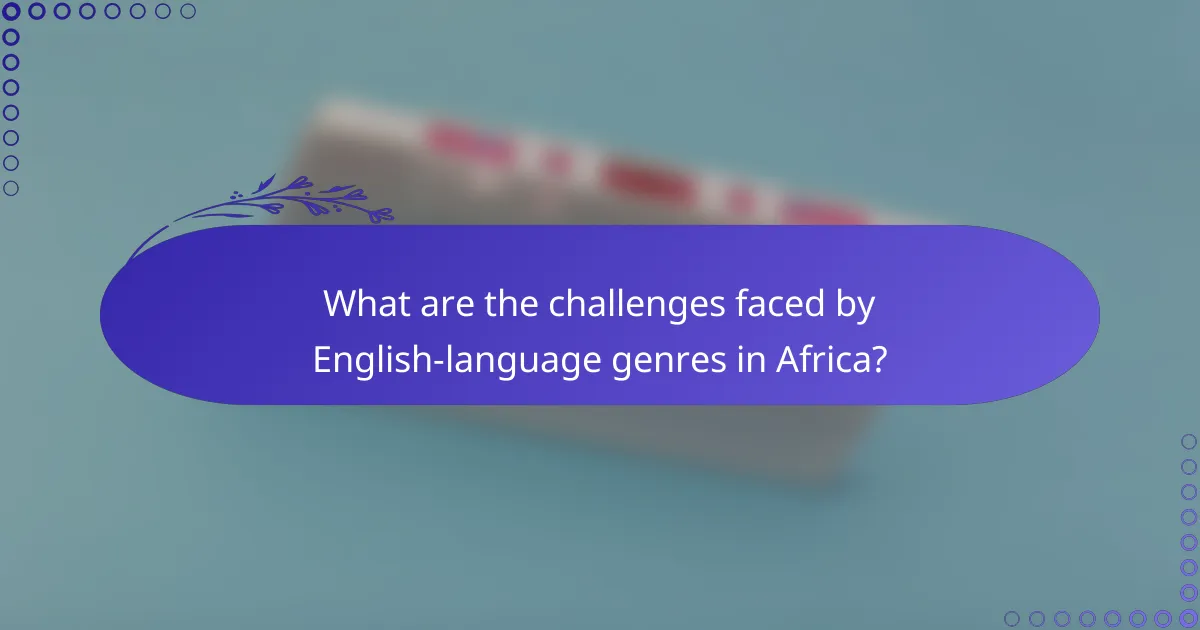
What are the challenges faced by English-language genres in Africa?
English-language genres in Africa encounter several challenges, including competition from local languages, limited access to distribution channels, and market saturation. These factors significantly impact the popularity and reach of English content across the continent.
Competition with local languages
Local languages dominate many African markets, often resonating more deeply with audiences than English. Genres in indigenous languages can offer cultural relevance and emotional connection that English-language content struggles to match.
This competition can lead to a preference for local narratives, making it difficult for English-language genres to gain traction. For instance, genres like Afrobeats and Nollywood films often incorporate local languages, enhancing their appeal over English alternatives.
Access to distribution channels
English-language genres often face barriers in accessing effective distribution channels within Africa. Many platforms prioritize local content, limiting the visibility of English works.
Additionally, internet penetration varies widely across the continent, with some regions experiencing low connectivity. This disparity can hinder the reach of English-language genres, as audiences in remote areas may not have reliable access to streaming services or digital platforms.
Market saturation
The African entertainment market is becoming increasingly saturated with diverse content, including local and international offerings. This saturation makes it challenging for English-language genres to stand out and attract audiences.
As more creators enter the market, the competition for viewer attention intensifies. English-language genres must innovate and adapt to local tastes to remain relevant, often requiring significant investment in marketing and production quality.
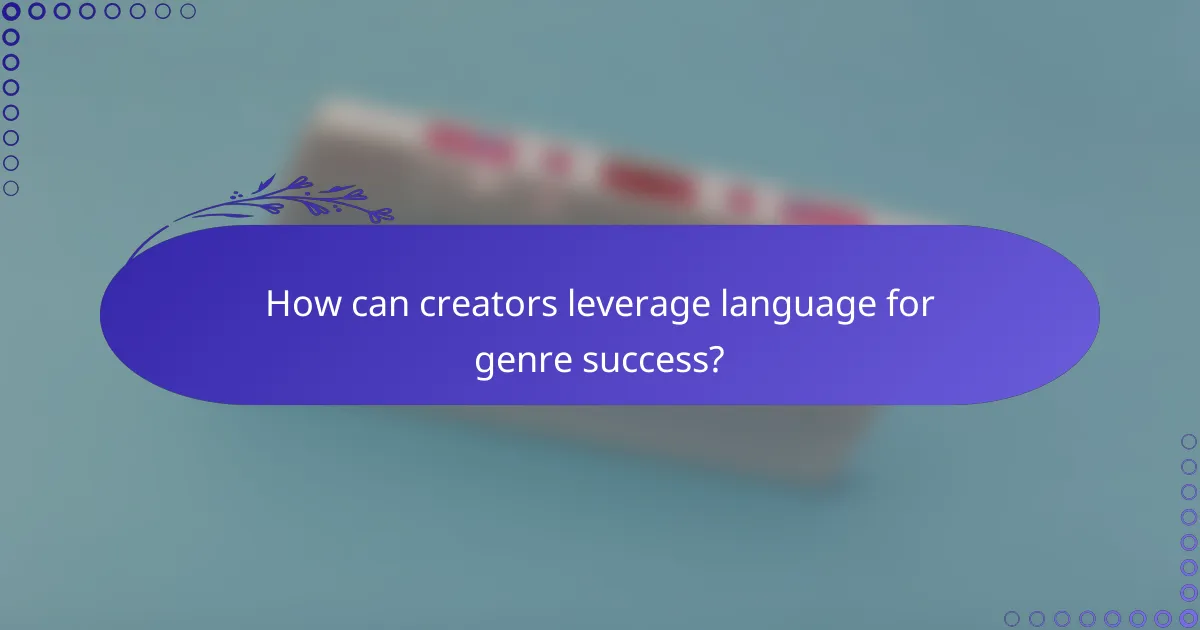
How can creators leverage language for genre success?
Creators can leverage language to enhance genre success by understanding and appealing to the linguistic preferences of their target audience. This involves using local dialects, multilingual content, and culturally relevant themes to connect more deeply with viewers or listeners.
Targeting bilingual audiences
Targeting bilingual audiences allows creators to reach a broader demographic by producing content in multiple languages. For instance, a film or music piece that incorporates both English and a local language can attract viewers from different backgrounds, increasing its popularity.
To effectively engage bilingual audiences, consider using subtitles or dubbing in local languages. This approach not only makes the content accessible but also shows respect for cultural nuances, which can enhance viewer loyalty and engagement.
Collaborations with local artists
Collaborating with local artists can significantly boost genre success by infusing authentic cultural elements into the content. These partnerships can help creators tap into established fan bases and gain credibility within local communities.
When collaborating, ensure that the partnership reflects genuine cultural representation. This could involve co-writing songs or co-producing films that highlight local stories, traditions, or languages, thereby resonating more with the audience.
Utilizing social media platforms
Utilizing social media platforms is crucial for promoting content in diverse languages and genres. Platforms like Facebook, Instagram, and TikTok allow creators to share snippets, trailers, or teasers in various languages, reaching a wider audience quickly.
To maximize impact, tailor content for each platform and language. Use hashtags relevant to both the genre and the language to improve visibility. Engaging with followers through comments and live sessions can also foster a sense of community and encourage sharing among bilingual users.
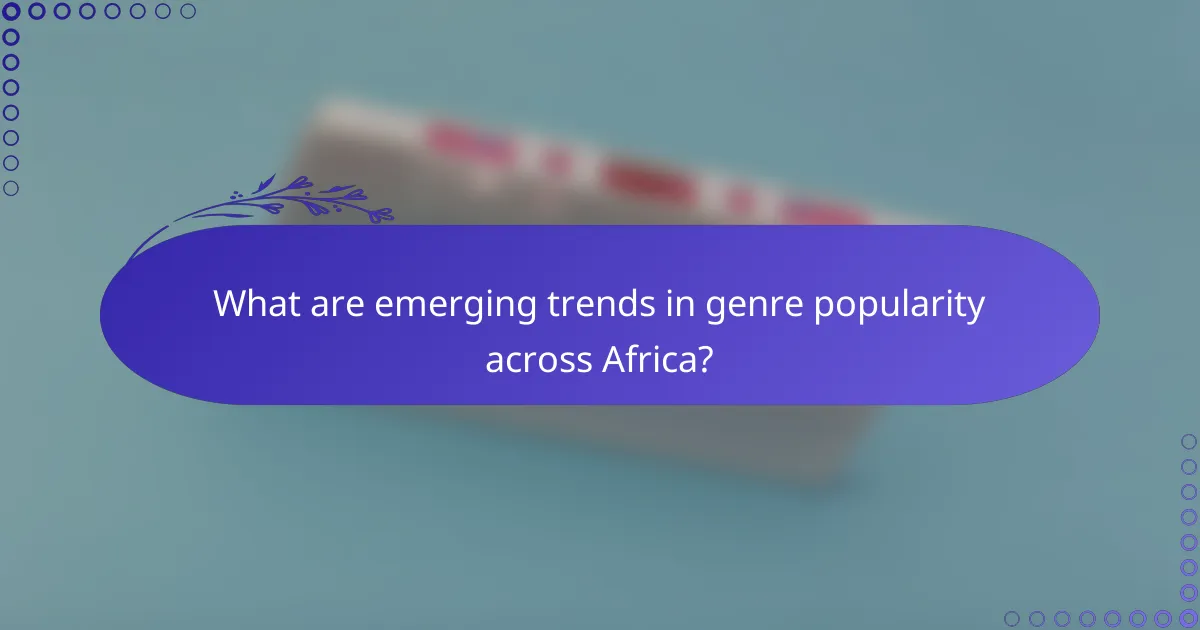
What are emerging trends in genre popularity across Africa?
Emerging trends in genre popularity across Africa reflect a dynamic landscape influenced by technology, culture, and collaboration. Genres such as Afrobeats, hip-hop, and traditional music are gaining traction, driven by factors like digital access and cross-cultural interactions.
Rise of digital streaming platforms
The rise of digital streaming platforms has significantly transformed how music is consumed in Africa. Services like Spotify, Apple Music, and local platforms such as Boomplay have made diverse genres more accessible, allowing artists to reach wider audiences without traditional barriers.
These platforms often feature curated playlists that highlight trending genres, enabling listeners to discover new music easily. As a result, genres that were once niche can now achieve mainstream popularity, with streaming data often guiding artists and producers in their creative decisions.
Increased cross-cultural collaborations
Increased cross-cultural collaborations are reshaping genre popularity by blending different musical styles and influences. Artists from various African countries are teaming up with international musicians, creating unique sounds that resonate across borders.
This trend not only diversifies the music landscape but also fosters a sense of unity among cultures. Collaborations often lead to innovative genre fusions, such as the mix of traditional African rhythms with contemporary pop or hip-hop, appealing to a broader audience and enhancing genre popularity.
